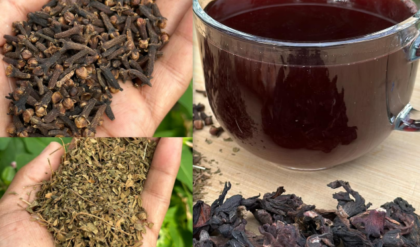Mint leaves, with their refreshing aroma and cooling sensation, are a beloved ingredient in cuisines worldwide. Known for their versatility and easy-to-grow nature, mint leaves have been used for centuries in traditional medicine to treat various ailments. They are packed with essential nutrients and compounds that can offer impressive health benefits when consumed regularly. In this article, we’ll explore why adding mint leaves to your daily diet could be a simple, effective way to improve your health.

Nutritional Profile of Mint Leaves
Though mint leaves are tiny, they pack a nutritional punch. A handful of fresh mint leaves (about 10 grams) provides:
- Vitamin A: Supports immune health, vision, and skin
- Vitamin C: Aids in collagen production and immune function
- Iron: Important for blood health and oxygen transport
- Fiber: Promotes digestion and gut health
- Antioxidants: Protect cells from damage by free radicals
Mint also contains small amounts of folate, manganese, and copper, all of which are essential for overall health.
Health Benefits of Consuming Mint Leaves Daily

- Improves Digestion
- Mint leaves are renowned for their digestive properties. Compounds in mint, such as menthol, help stimulate the production of digestive enzymes and bile, promoting efficient digestion. This can ease symptoms of indigestion, bloating, and gas, making it an ideal choice after meals.
- Reduces Respiratory Issues
- Mint leaves contain menthol, a natural decongestant, which can help alleviate respiratory congestion. Consuming mint or adding it to warm water helps open up nasal passages, reduces throat irritation, and relieves symptoms of asthma and seasonal allergies.
- Aids in Weight Loss
- Mint leaves are low in calories and can aid in weight management. By improving digestion and metabolism, they support more efficient calorie-burning. Additionally, their fresh flavor can help curb cravings and reduce overeating, making them a healthy choice for those looking to manage their weight.
- Relieves Headaches and Migraines
- Mint leaves contain compounds that provide a natural cooling effect, which can relieve headache pain and reduce migraine symptoms. Consuming mint or applying it as a balm to the temples is known to ease tension and provide a soothing effect.
- Supports Oral Health
- Mint leaves have natural antibacterial and anti-inflammatory properties, making them an effective way to maintain oral hygiene. Chewing on fresh mint leaves or incorporating them into teas helps freshen breath, combat harmful bacteria in the mouth, and reduce the risk of gum diseases.
- Boosts Immune System
- Mint is rich in antioxidants, particularly rosmarinic acid, which can enhance immune function. These antioxidants help protect the body from free radicals and strengthen the immune response, helping to ward off infections and illness.
- Enhances Skin Health
- The anti-inflammatory and antioxidant properties of mint leaves can benefit the skin by reducing inflammation and preventing acne. Mint also contains vitamin A, which helps control the production of oil in the skin, preventing clogged pores and blemishes. Applying mint-infused products can soothe irritation, while consuming mint regularly helps maintain clear and glowing skin.
- Reduces Stress and Improves Mood
- Mint leaves have been shown to have a calming effect on the nervous system. The menthol in mint has a natural, relaxing aroma that reduces anxiety, stress, and mental fatigue. Consuming mint tea or simply inhaling its aroma can improve focus, relieve stress, and enhance mood.
- Lowers Blood Pressure
- Mint leaves contain potassium, which helps regulate blood pressure by reducing sodium levels in the body and relaxing blood vessel walls. Regular consumption of mint, combined with a balanced diet, can contribute to improved heart health and stable blood pressure.
How to Incorporate Mint Leaves into Your Daily Diet

There are numerous ways to enjoy mint leaves daily. Here are a few simple ideas:
- Mint Tea: Brew fresh or dried mint leaves in hot water for a soothing, caffeine-free tea.
- Smoothies and Juices: Add a handful of mint leaves to smoothies or juices for a refreshing taste and extra nutrients.
- Salads and Dressings: Chop mint leaves and add them to salads, or use them to make a tangy, herbed dressing.
- Yogurt and Desserts: Mix mint leaves into yogurt, desserts, or even homemade ice cream for a hint of minty freshness.
- Infused Water: Add mint leaves to water along with lemon or cucumber slices for a naturally flavored drink.
Precautions
While mint leaves are generally safe to consume, excessive intake may cause mild side effects, especially for individuals with gastroesophageal reflux disease (GERD), as mint can relax the lower esophageal sphincter and potentially exacerbate symptoms. It’s best to start with small amounts and observe how your body responds.

Final Thoughts
Adding mint leaves to your daily routine is a simple, natural way to enjoy a wide range of health benefits. From aiding digestion and boosting immune health to relieving stress and improving skin, the advantages of mint are backed by centuries of use and modern science alike. Mint’s refreshing flavor and versatility make it easy to incorporate into meals, drinks, and even skincare routines.

If you’re looking to enhance your well-being with an affordable, flavorful herb, mint leaves may just be the perfect addition to your lifestyle. Enjoy the freshness and health benefits that come with making mint a daily part of your diet!





